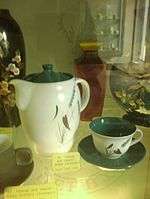Denby Pottery Company
 | |
| Private | |
| Industry | Pottery |
| Founded | 1809 |
| Headquarters | Denby, Derbyshire, England |
Area served | Worldwide |
Key people | Sebastian Lazell, Managing director |
| Products | Tableware, kitchenware |
| Owner | Hilco |
| Website |
www |
Denby Pottery Company Ltd is a British manufacturer of pottery, named after the village of Denby in Derbyshire where it is based.
History

The pottery at Denby was founded on the estate of William Drury-Lowe in 1809 as a manufacturer of stoneware bottles.[1] It was run by Joseph Jager in partnership with Robert Charles George Brohier; the partnership was dissolved in 1814.[1] By this time, clay from a deposit on the land was already in use at the Belper Pottery. At the beginning of 1815 William Bourne of the Belper Pottery and his sons William, John and Joseph took a 21-year lease on Brohier and Jager's factory.[2] Joseph Bourne ran the works at Denby and Belper in tandem until 1834, when he closed down the Belper pottery and moved its equipment and workforce to Denby. Bourne later took over the Codnor Park and Shipley Potteries, and merged them into the Denby works in a similar manner. Joseph Bourne took his son Joseph Harvey Bourne into partnership, and the company became known as Joseph Bourne and Son, a name it kept even after the death of Joseph Bourne in 1860.
Using a new patent process for drying slip invented by Needham and Kite of Vauxhall, the pottery produced at least 25 tons of workable clay each day. In the nineteenth century most of the ware produced was salt-glazed stoneware. Bourne patented improved kilns for stoneware in 1823 and 1848.[3] By the 1870s the pottery was producing a wide range of utilitarian stoneware products including telegraph insulators, ink bottles, pickle and marmalade jars, spirit and liquor bottles, foot warmers, churns, mortars and pestles, pipkins, feeding-bottles, pork pie moulds, druggists' shop-jars, snuff-jars, spirit-barrels, pudding-moulds, and water filters. They also made more decorative "hunting jugs" sprigged with moulded decorations of huntsmen, windmills, men smoking or beehives, sometimes with the handle in the form of a greyhound, and terracotta goods, both practical and decorative.[4]
The company benefited greatly from its transport links into Derby and beyond, particularly when the Midland Railway opened its Ripley Branch. It had a siding at Denby Wharf (the terminus of the Little Eaton Gangway) approximately opposite to the factory. Each week around three or four vans would be dispatched to Chaddesden sidings (near Derby station) where they would be connected to an express to St Pancras in London and the company's warehouse at the Granary.[5]
The company, whose name is now principally associated with stoneware, initially produced bottles and jars, before specialising in kitchenware and, eventually, in tableware, for which it is best known today. In order to increase capacity the nearby Langley Mill Pottery was acquired in October 1959. During the 1950s and 1960s a number of designers worked for Denby, including Gill Pemberton.
In 1987 the company was taken over by the Coloroll Group. After Coloroll went into receivership in 1990, Denby was subject to a management buyout, and was floated in 1994.[6]
In the early twenty-first century Denby expanded its use of materials to include glass (wine glasses, tumblers and bowls) and metal (cutlery and cooking utensils). It also introduced fine dining ranges in porcelain and bone china.
The company was subject to a £30 million management buyout in 2009, after suffering a decline in sales. The company had £72 million of debt written off at the time of the buyout.[7]
In 2010 Denby acquired Burleigh Pottery.
In February 2014, the company was put up for sale by its owner Hilco Capital following expressions of interest from other companies.[8] Hilco cancelled the sale in January 2015 due to improvements in the company's growth.[9]
References
- 1 2 The notice of dissolution refers to "the Partnership hereforeto carried on by the undersigned, Robert Charles George Brohier, and Joseph Jager, as Stone Bottle-Manufacturers, and otherwise, at a place called Jagersburgh, in the Parish of Denby, in the County of Derby, under the stile or firm of Brohier & Jager...""London Gazette". Retrieved 1 July 2011.
- ↑ "Derbyshire Record Office Online Catalogue". Retrieved 1 July 2011.
- ↑ "Derbyshire Record Office Online Catalogue". Retrieved 1 July 2011.
- ↑ Jewitt, Llewellyn (1878). The Ceramic Art of Great Britain. 2. p. 133.
- ↑ Sprenger, Howard (2009). Rails to Ripley. Southampton: Kestrel. ISBN 978-1-905505-16-6.
- ↑ Bowen, David (25 April 1994). "Directors make a fortune from ruins of Coloroll". London: The Independent. Retrieved 29 April 2011.
- ↑ "Pottery firm secured in buyout". BBC News. 19 February 2009. Retrieved 5 February 2014.
- ↑ "Denby Pottery up for sale in Derbyshire". BBC News. 3 February 2014. Retrieved 5 February 2014.
- ↑ "Denby announces end of sale process". Hilco Capital. 8 January 2015. Retrieved 17 November 2016.
Bibliography
Hopewood, Irene. Denby pottery, 1809-1997: dynasties and designers (ISBN 0903685523)
External links
| Wikimedia Commons has media related to Denby Pottery. |